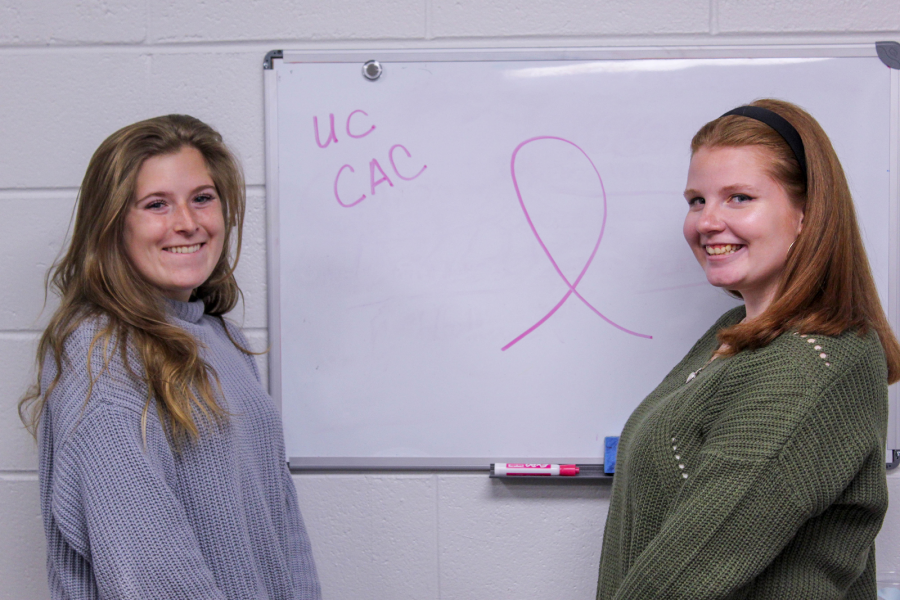October is Breast Cancer Awareness Month and the UC community has been active in spreading the word about the dangers of this common cancer. Multiple events have been hosted throughout the month to raise awareness and promote the cause of stopping the deadly disease.
Breast cancer is one of the most common kinds of cancer in women after skin cancer, according to the U.S. Department of Health and Human Services. About one in eight women born today in the United States will be diagnosed with breast cancer during their lives. Although it is rare, men can get breast cancer as well – more than 2,000 men are diagnosed each year.
Common symptoms include: Breast pain, swelling of the breast, lumps, skin irritation, redness and others.
“The good news is that most women can survive breast cancer if it’s found and treated early,” said Terri Sherman, director of the Student Health Center and nurse practitioner. “A mammogram, the screening test for breast cancer, can help find breast cancer early when it’s easier to treat.”
Michelle Hartman is a graduate student in her fourth year of the nutrition and dietetics program. She said breast cancer awareness is critical for women of all ages.
“It’s a cancer that definitely affects young women, too,” she said. “A young woman, especially college students, should become aware of the complications. The activities during October bring awareness that we, as young women, should get tested.”
Hartman has had secondhand experience with breast cancer through two friends who are survivors and have been in remission for years.
Both of Hartman’s friends shared their cancer struggles with her and encouraged her to seek testing at a young age.
“They’re first-hand experience for it because they advocate for us young women and tell us how important it is to get tested,” she said. “Most signs of cancer you don’t see it until it’s in the last stages.”
UC is actively working to limit breast cancer’s devastating consequences by encouraging people to seek testing and promoting research for a cure.
“This October, Utica College is proud to participate in National Breast Cancer Awareness Month,” Sherman said.
Some of UC’s successful events promoting breast cancer awareness have ranged from “Pink Week” to learning how to detect common breast cancer symptoms.
Colleges Against Cancer is a student organization at UC promoting cancer awareness. The organization hosted “Pink Week” during the week of Oct. 7, which was a series of education events about breast cancer. On Monday, the organization hosted a Pink Week Kickoff, which included informational pamphlets on breast cancer and a group effort to decorate the campus in pink ribbons. On Tuesday and Wednesday, the organization hosted a raffle to support breast cancer awareness. The club also participated in the “Making Strides Walk” against breast cancer at Masonic Community Center in Utica on Sunday.
Liz Gabel, junior in the wellness and adventure education major, is the president of Colleges Against Cancer.
“The ‘Pink Week’ was to show that breast cancer affects both men and women and it’s important for both genders to check themselves,” Gabel said. “It’s important to know the next couple of steps after that.”
Colleges Against Cancer hosts an advocacy event every month connected to a type of cancer relevant to the season. The largest event of the year for the organization is Relay for Life, which brought in $30,000 from the UC community last year.
Gabel also works with the vice president to spearhead the events.
“Students have also reached out to us and want to be more involved,” Gabel said.
Gabel said many of UC’s staff participate in the organization.
“They are always willing to donate and are always just so supportive,” Gabel said.
Gabel and Vice President of the Colleges Against Cancer Casey Hourican also mentioned some of the staff working in Learning Services in White Hall who have told their stories of being impacted by breast cancer through close family members who were diagnosed.
“That’s why we have such a large turnout for relay because cancer affects everyone,” Hourican said. “We all have a personal touch to cancer.”
The Student Health Center also gave Colleges Against Cancer information on how to protect and check oneself for warning signs of breast cancer. This was an effort by the center to promote awareness of breast cancer, not to self-diagnose, according to Gabel.
“Start testing young, even in your teenage years,” said Shelby Byrd, junior in the history program. “I’ve had friends who are young but they’ve been recommended by their doctors to be checked at an early age.”
Byrd has heard about the awareness events on campus, and also at other colleges such as MVCC.
“I think spreading awareness in general is important,” Byrd said. “The college is a learning environment.”
The drastic symptoms and treatments of breast cancer has a ripple effect that impacts many people close to the person diagnosed, not just the direct victim. However, early detection is important.
“Go to your doctor and have an exam and do self-exams,” Byrd said.
Sophia Salatino, junior in the psychology program, said breast cancer is a common cancer for many women. Salatino was introduced to the dangers of breast cancer at an early age. She also urged UC students to get tested.
“It’s always better to know than not,” she said. “It is better earlier rather than later.”
The director of the Student Health Center encouraged students to test for cancer.
“Talk to a medical provider about your risk for breast cancer, especially if a close family member of yours had breast or ovarian cancer,” Sherman said. “Your provider can help you decide when and how often to get mammograms.”


















![President Todd Pfannestiel poses with Jeremy Thurston chairperson Board of Trustees [left] and former chairperson Robert Brvenik [right] after accepting the university's institutional charter.](https://uticatangerine.com/wp-content/uploads/2023/10/unnamed.jpeg)


















































































































